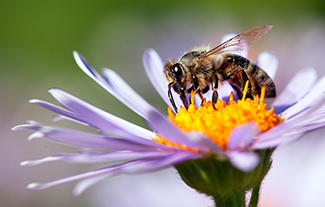What To Do About Bees?
What Do I Do About The Bees In My Yard?
Many farmers, gardeners and homeowners are worried that honey bees are being threatened with extinction due to the spread of mites and parasites. Insecticides and pesticides may also harm bees and other pollinators.
 If you're looking to attract bees to your yard, homeowners are often encouraged to plant flowering bushes and desert plants that will attract bees and butterflies which will encourage pollination of fruits and vegetables. Some favorites for bees may already be in your yard depending on where you live – plants like cat’s claw acacia, lupine, desert ironwood, fairy dusters, ocotillo, Parry’s agave, and even saguaros and chollas. The app BeeSmart can help you identify good pollinating plants for your region. There are many lists of possible plants online that will attract bees, including www.feedabee.com.
If you're looking to attract bees to your yard, homeowners are often encouraged to plant flowering bushes and desert plants that will attract bees and butterflies which will encourage pollination of fruits and vegetables. Some favorites for bees may already be in your yard depending on where you live – plants like cat’s claw acacia, lupine, desert ironwood, fairy dusters, ocotillo, Parry’s agave, and even saguaros and chollas. The app BeeSmart can help you identify good pollinating plants for your region. There are many lists of possible plants online that will attract bees, including www.feedabee.com.
However, as a homeowner you also have to be alert to possible problems with Africanized honey bees. These aggressive bees began migrating to the United States in the 1990s and have been mating with European honey bees to produce hybrids. Most of these Africanized bees and hybrids live in southern states ranging from California and Arizona to Georgia. It’s impossible to tell Africanized bees apart from other more friendly bees just by looking at them.
Precautions from our friends at Blue Sky Pest Control:
Dealing with Africanized Honeybees is very serious and should only be attempted by professionals. They are very aggressive and deadly. Please take some time and read through this behavior and background summary we put together.
During spring and summer, you can find feral bees building hives in attics, under eaves of houses, in mulberry and cottonwood trees, in dog houses, water meter boxes and even in stacks of discarded tires.
Don’t try to tackle those hives by yourself, says Brett Cameron, an official with the state Department of Agriculture, who has raised honey bees for more than 50 years. He urges homeowners to keep an eye on their yards and call an exterminator if they spot a hive in the area. There are also bee experts that will remove the hives and relocate the bees.
The goal is to find a good balance between saving the bees and protecting ourselves and our families from harm.
###
Podcast
Bee Expert David Charlesworth discusses how bee hives form, why they swarm and how a regular bee can become a killer bee. What you can do to prevent bee swarms. And his live extraction method of bee hives to safer areas. Eric Berg talks about Arizona's wine history. How American Wine started in the southwest, the story of leather used for wine making and other people and places that lead to today's Arizona fruit of the vine.
What to know about Bees and how to survive a bee attack!
All about bees! We are joined by Eric, Leah, and Bailey Nisbet of Nisbet Family Farms - 4th and 5th generation beekeepers!
